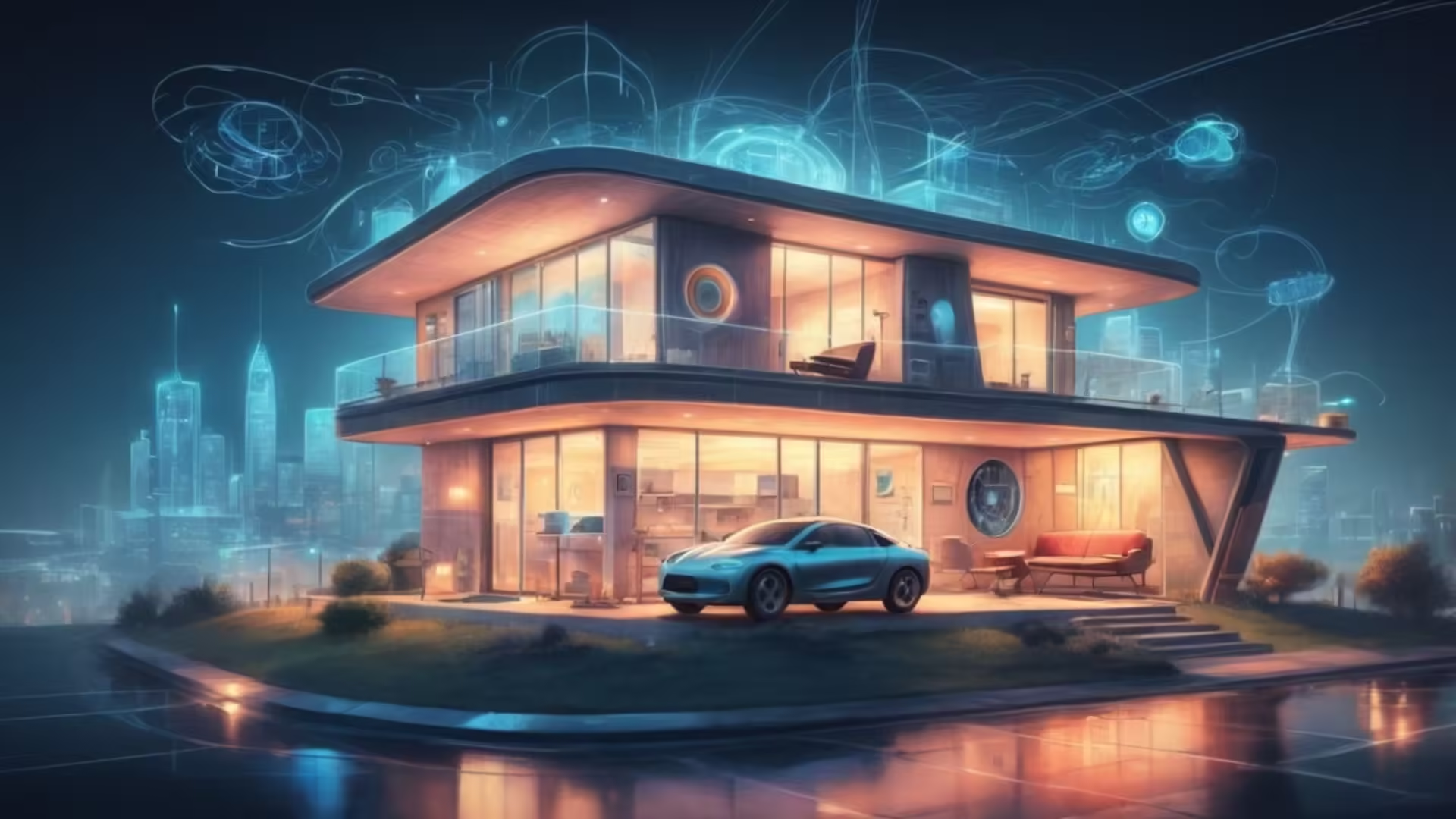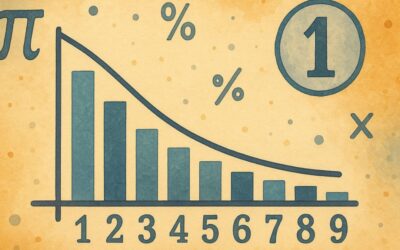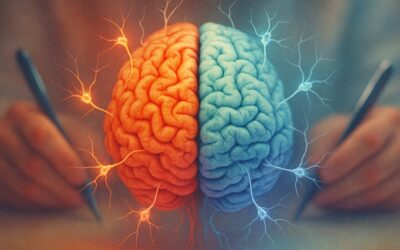- The Gist
- Understanding the Internet of Things: A Brief Overview
- Smarter Homes for Convenient Living
- Connected Cars and Smarter Transportation
- Transforming Healthcare with IoT
- Boosting Productivity in the Workplace
- Smart Cities: Creating a Sustainable Urban Future
- Privacy and Security Concerns in the IoT Era
- The Future of Life with IoT
- Let’s Talk
- Let’s Learn Vocabulary in Context
The Gist
Understanding the Internet of Things: A Brief Overview
The Internet of Things, commonly referred to as IoT, is a network of devices connected via the internet that can collect, share, and analyze data. Unlike traditional devices that operate in isolation, IoT devices interact, communicate, and work together to optimize user experiences and functionality. From smartphones and wearables to smart home appliances and industrial machinery, IoT is growing rapidly and seeping into every corner of our lives.
Smarter Homes for Convenient Living
IoT’s impact on homes is already visible through devices like smart thermostats, voice-activated assistants, and connected appliances. Imagine a home where:
- Climate Control: Thermostats adjust themselves based on your preferences and the weather forecast.
- Energy Management: Lights turn off automatically when rooms are empty, saving energy.
- Home Security: Security systems alert you and the authorities in case of any break-in, and surveillance cameras offer real-time footage straight to your phone.
These advancements not only make life more convenient but also provide cost savings and contribute to more sustainable energy use.
Connected Cars and Smarter Transportation
Transportation is undergoing a radical shift with IoT integration. Vehicles today are more than just modes of transport—they’re becoming intelligent machines that offer safer, more efficient journeys. Some key areas of IoT’s impact on transportation include:
- Traffic Management: IoT-powered smart city infrastructure can manage traffic flow and alert you to accidents or bottlenecks, reducing overall commute times.
- Predictive Maintenance: IoT sensors can monitor car components and notify owners when maintenance is due, helping prevent breakdowns.
- Self-Driving Cars: Autonomous vehicles rely heavily on IoT technology, enabling real-time communication between vehicles and their surroundings, which could eventually make driving safer and more accessible.
Transforming Healthcare with IoT
Healthcare is set to be one of the biggest beneficiaries of IoT. With wearable devices, remote patient monitoring, and predictive health systems, IoT is making healthcare more accessible and personalized. Here’s how:
- Remote Monitoring: Wearables can track patients’ vital signs in real-time, allowing doctors to intervene before emergencies.
- Personalized Treatment: Data from IoT devices can offer insights into patient habits, helping doctors tailor treatment plans.
- Streamlined Hospital Management: IoT devices can track equipment usage, monitor patients, and manage resources, optimizing hospital workflows and reducing wait times.
Boosting Productivity in the Workplace
IoT in the workplace is paving the way for smarter offices that enhance productivity, comfort, and security. From connected meeting rooms to AI-powered assistants, here’s how IoT is reshaping the modern office:
- Improved Collaboration: IoT-enabled devices can sync across teams, making remote work and collaboration easier than ever.
- Automated Tasks: Tasks like scheduling, ordering supplies, and monitoring inventory can be automated, freeing up employee time.
- Smart Environments: IoT-controlled lighting, temperature, and seating make workplaces more comfortable and energy-efficient.
Smart Cities: Creating a Sustainable Urban Future
IoT technology extends beyond individual users to entire cities, where it can address urban challenges and create more sustainable environments. Some examples include:
- Waste Management: IoT sensors can track waste levels in bins, optimizing collection routes and reducing fuel consumption.
- Energy Conservation: IoT systems in smart cities can monitor and manage energy usage in real time, making urban areas more eco-friendly.
- Public Safety: IoT-connected streetlights and surveillance systems can help monitor and deter crime, making cities safer.
Privacy and Security Concerns in the IoT Era
While IoT offers incredible potential, it also raises questions about privacy and security. As more personal data is shared across connected devices, the risk of breaches and unauthorized access increases. To address these concerns:
- Data Encryption: Devices need robust encryption to protect user information.
- User Control: Manufacturers are developing ways to give users greater control over their data.
- Regulation and Standards: Governments and organizations are working to create standards for IoT devices to ensure security and privacy.
The Future of Life with IoT
The Internet of Things is more than just a passing trend—it’s the beginning of a transformation that will influence every aspect of our lives, from how we communicate and travel to how we monitor our health and manage our cities. As IoT continues to evolve, it will bring new challenges, particularly in terms of data privacy and security. However, with these concerns addressed, IoT holds the promise of a more connected, efficient, and sustainable future, ultimately enhancing the quality of life for people around the world.
Let’s Talk
So, let’s really think about this whole Internet of Things concept for a moment. It’s wild, right? We’re essentially saying that everything around us could soon be “smart” enough to help us out. Imagine your coffee maker not only brewing your morning espresso but also ordering more beans when you’re running low. Or maybe your fridge will nag you to stop buying all that junk food because it “knows” what you’ve been storing. It’s like everything is turning into that one overly helpful friend who just can’t stop suggesting things.
But, on a serious note, how much of this tech would actually make life better? That’s where it gets interesting. Sure, having a “smart” light bulb might seem like a luxury, but what about IoT for things that really impact our daily lives? Think of city traffic. Ever been stuck in a traffic jam and wished someone somewhere could just reprogram the lights or clear up the road magically? Well, with IoT, that might not be so far-fetched. Cities are already starting to use IoT to manage traffic flow based on real-time data, easing congestion and making our commutes a little less soul-crushing. Imagine knowing the exact time to leave home so you could dodge the worst of the traffic—now that’s a game-changer.
And then there’s healthcare. I mean, how cool would it be if your doctor could monitor your health without you having to set foot in their office every time? With wearable tech, this is already happening in small ways. People with chronic conditions can now track their vitals and get alerts if something’s off, and their doctors can be notified immediately. It’s like having a tiny, invisible nurse constantly on the lookout, minus the hospital bill. But let’s be real—are we ready for our watches to give us health advice, too? “You’ve had enough pizza this week, go for a jog!” Yeah, thanks, smartwatch, but some things are best left between me and my conscience.
And what about smart homes? We’re talking about a place that can actually adapt to your lifestyle. Imagine coming home after a long day, and the house already has the lights dimmed, your favorite playlist going, and the thermostat set to that perfect temperature. No more fumbling with switches or worrying about leaving the AC on. Or, picture this: your bed senses your sleep patterns and adjusts your mattress firmness during the night to improve your sleep. It’s almost like having a house that’s more in tune with your needs than, well, you are!
But here’s a question to think about: Do we really want all this smartness in our lives? Sure, the convenience is amazing, but we’re talking about a world where even your toaster might someday know more about your morning habits than you do. And what about privacy? The more these devices know, the more we’re sharing about ourselves, consciously or not. Maybe we’re okay with that, maybe not. I mean, it’s one thing for our tech to help us live smarter, but it’s another for it to watch and analyze our every move. Will we one day look back and wonder if we went a little too far?
There’s also the whole question of whether it will make us a bit lazier. I mean, if your car can practically drive itself, your house keeps itself secure, and your fridge does the grocery shopping, what will we be left to do? Maybe we’ll spend all that extra time on important things, like picking out a new series to binge-watch. Or maybe, just maybe, we’ll have more time to connect with the people around us and do things that truly matter.
So here’s the real question: Is IoT going to be the thing that frees us, or will we just end up as overly dependent on all these gadgets? Either way, the world of IoT is coming, and it’s going to change how we live, work, and probably even how we think about ourselves in this increasingly “smart” world. Are you ready to let your fridge have a say in your life?
Let’s Learn Vocabulary in Context
Let’s dive into some of the most useful words and phrases we used while exploring the Internet of Things and see how they can add flavor to your everyday vocabulary. These words pop up in so many different contexts, so knowing exactly how to use them can really boost your understanding and expression.
First up, buzzword—a trendy term or phrase that’s used so frequently it almost becomes jargon. In our discussion, IoT itself is often a buzzword. You might notice buzzwords popping up everywhere, from business to tech to lifestyle. If someone’s always talking about “disruptive innovation” or “going viral,” that’s a buzzword in action!
Now, let’s talk about nag. We used this to describe that hypothetical fridge that might remind you to stop buying unhealthy food. To nag is to repeatedly remind someone of something, usually in an annoying way. Your mom asking if you’ve done your homework? That’s a classic nag. But remember, we often say something is “nagging” us when it’s a recurring thought or worry.
Then, there’s game-changer. When something is called a game-changer, it means it significantly impacts or changes the usual way of doing things. IoT in transportation, like predicting traffic jams, is a game-changer because it changes how we think about commuting. In everyday talk, you might say, “Getting this new job was a game-changer for my career.”
Another good one is seeping into, which means something gradually entering or influencing an area. IoT technology is seeping into homes, offices, and even cities. You might also say, “Social media is seeping into every part of our lives,” to describe how it’s becoming a part of everything we do.
We also used congestion when describing traffic. In a city, congestion means overcrowded or jammed conditions, like when there are too many cars on the road. But congestion can also refer to overcrowding in general or even to a stuffy nose. So, you might say, “There’s a lot of congestion downtown today” or “I can’t breathe well; I have nasal congestion.”
Now, maintenance came up when talking about how IoT could help predict when a car needs repairs. Maintenance means keeping something in good working order, like a car or a building. You might tell someone, “Regular maintenance on your laptop will help it run smoothly.”
Another interesting phrase we used is tailor treatment, which refers to making something specific or personalized, often used in healthcare or fashion. If a doctor tailors a treatment plan, they customize it to fit a patient’s needs. You might also hear it in a personal context, like, “I need to tailor my study methods to what works best for me.”
Let’s not forget sync. When devices sync, they coordinate with each other to share data or stay up-to-date. If your phone and computer sync, your calendar, emails, or photos might be accessible on both devices. It’s also used casually in day-to-day life—“Let’s sync our schedules to find a time that works for both of us.”
A very familiar word we talked about was habit. We all have habits—things we do regularly or without much thought. IoT devices, like wearable health monitors, might even help us spot our habits. Saying, “I have a habit of checking my phone first thing in the morning” is one way to use it, and we all know how powerful habits can be.
Finally, we used privacy in discussing concerns about IoT. Privacy means keeping personal information secure or out of reach from others. With IoT collecting more data, privacy is definitely something we all think about. You could say, “I value my privacy when it comes to sharing details online.”
So, after all that vocabulary, let’s get you thinking. Do you think technology should really “tailor” its services to each of us individually, or are we losing too much privacy in the process? And speaking of habits, what habits do you think might change the most as IoT continues to seep into our lives?










0 Comments